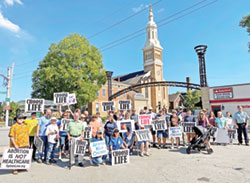Archbishop Thompson calls Catholics to be ‘all in’ when it comes to respect for life

Participants in the LifeChain event in Lawrenceburg pose in front of St. Lawrence Church on Respect Life Sunday, celebrated on Oct. 1 this year. The Catholic Church celebrates October as Respect Life Month, a time to consider more deeply why every human life is valuable and reflect on how to build a culture that protects life from conception to natural death. (Submitted photo)
By Natalie Hoefer
Every October, Catholics are called to consider more deeply why every human life is valuable and reflect on how to build a culture that protects life from conception to natural death.
In light of this call, the first Sunday of October is known as Respect Life Sunday, which this year fell on Oct. 1. On that day, Archbishop Charles C. Thompson celebrated a Mass at SS. Peter and Paul Cathedral in Indianapolis.
He also bestowed three Catholics with the archdiocese’s pro-life awards. Mary and Larry Dougherty of Immaculate Heart of Mary Parish in Indianapolis received the Archbishop Edward T. O’Meara Respect Life Award, and Sara Cabrera of St. Thomas More Parish in Mooresville received the Our Lady of Guadalupe Pro-Life Youth Award. (See related article for more on this year’s recipients)
Archbishop Thompson noted at the beginning of the Mass that this year’s Respect Life Month theme chosen by the U.S. Conference of Catholic Bishops is “Radical Solidarity,” described on its website as the need to be “courageously pro-woman, promoting a choice that truly protects, accompanies
and supports women and their children.” (See related editorial here)
“It means that we have to be all in” in respect for life, the archbishop said.
He fleshed out that thought in his homily.
“Whatever the life issue may be, the basis of one’s approach to the dignity of the human person and sacredness of life stems from the ability of seeing, believing and understanding,” he said. “Not merely the parts [of respect life issues], but the whole, radical solidarity.”
Archbishop Thompson honed-in on words from the day’s second reading: “Do nothing out of selfishness or out of vainglory; rather, humbly regard others as more important than yourselves, each looking out not for his own interests, but also for those of others” (Phil 2:3-4).
“Just imagine how much more unity there would be in our world, less polarization, less shaming and bullying if we took those words to heart,” he said. “Imagine approaching life issues from this very Christ-centered perspective of humbly regarding others as greater than oneself.”
Particularly among those “others,” he mentioned seeing “the unborn, the poor, the homeless, the sick, the elderly, the immigrant, the refugee and the incarcerated as persons with dignity rather than problems to be solved.”
Archbishop Thompson admitted it is “not easy” to put others’ needs first.
“We have a tendency to focus more on our own needs than those of others,” he said. “In fact, we have a tendency to focus more on our wants than the needs of others.”
To humble oneself and put others first, he said, “is only possible if we commit our lives to ongoing prayer [and] discernment, not trying just merely to see, but to encounter the person of Jesus Christ. … We must never tire of praying and working to end the atrocities of abortion, capital punishment, racism, human trafficking, pornography, addiction, shaming, bullying, domestic violence and all forms of abuse.”
He encouraged Catholics of central and southern Indiana to take on the attitude of Christ as described in the second reading, “who emptied himself, becoming obedient to the point of death on the cross.”
The archbishop cited the words of Pope St. Paul VI in his 1975 apostolic exhortation “Evangelii Nuntiandi” that “modern man listens more willingly to witnesses than to teachers, and if he does listen to teachers, it is because they are witnesses.”
In light of those words, Archbishop Thompson called on Catholics to “be witnesses of humbly regarding others as more important than ourselves.
“It is through consistent witness of respecting the sacredness of life from the moment of conception to natural death that we will be able to reach the hearts of others.” †
